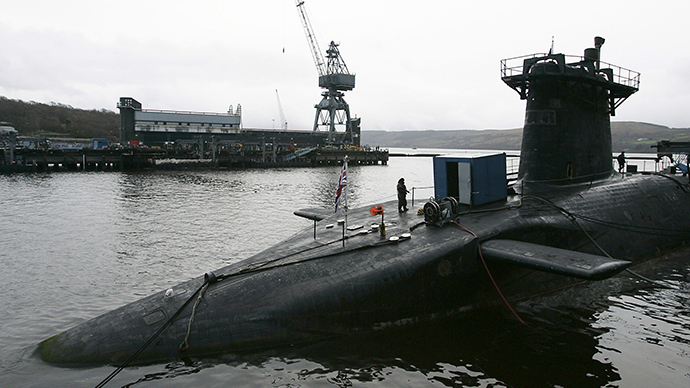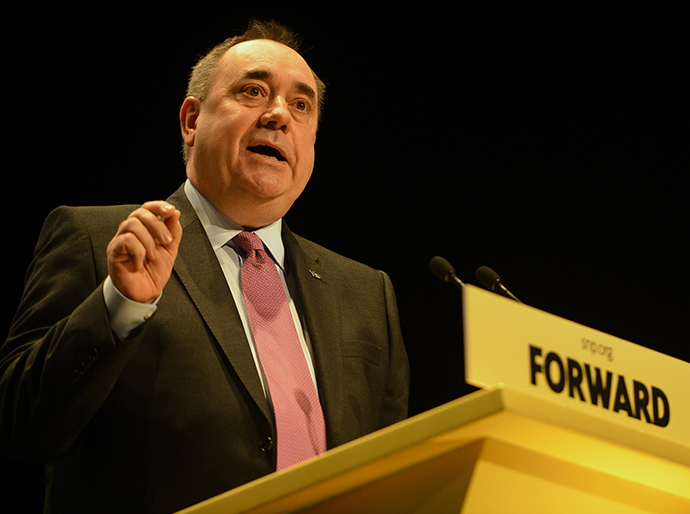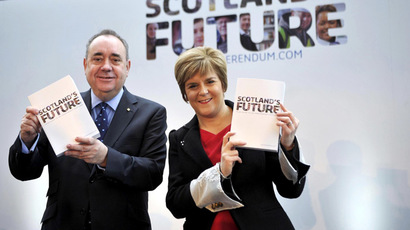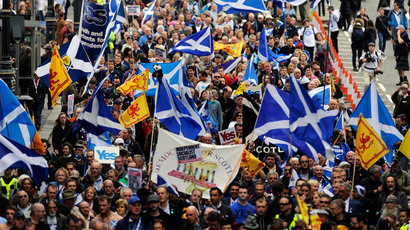Edinburgh accuses UK of hushing up British nuclear leak on Scottish territory

The British government has “disrespected” Scotland by keeping quiet about a nuclear leak at a Scottish-based reactor for two years, believes nationalist minister, Alex Salmond, all at a time of high tensions ahead of a referendum on independence.
Salmond, the Scottish National Party’s First Minister, is now demanding an apology and an explanation from British Prime Minister David Cameron that an internal leak, found all the way back in January 2012 at the Dounreay site in Scotland, which houses an MoD test reactor identical to the one used by the British nuclear submarine fleet, was kept under wraps all this time with little excuse, the Herald Scotland reports.
“This shocking turn of events leaves Philip Hammond with some very serious questions to answer. Not only does it look as if he has misled parliament – he has misled it on the extremely serious matter of nuclear emissions– which will send a shiver down the spine of everyone in Scotland. It has taken nearly two years for the Westminster government to even tell the Scottish government about problems at the nuclear facility – now it looks as if there is a cover up and the full facts are still not known,” the first minister said.
The news that led to full-on accusations of underhand tactics and so outraged the Scottish parliament was actually revealed unexpectedly. The UK defense secretary, Philip Hammond, brought up the matter on Thursday that the oldest British sub, the HMS Vanguard, was in need of having its reactor refueled. He also announced that a small internal leak had been discovered at another identical test reactor, with elevated radioactivity levels in the cooling water.
The Scottish accused Westminster of playing down just how long ago the discovery was made.
Hammond, in defense, said that the reactor had been shut down shortly after “low levels of radioactivity” had been discovered, and that the Independent Defence Nuclear Safety Regulator and the Scottish Environment Protection Agency (SEPA) had been notified.
Scotland’s first minister has written a letter to the British expressing “deep dismay” and is treating it as an insult to Scotland that Westminster had such a lax attitude to communication under the Memorandum of Understanding on Devolution – a 2012 document that sets out principles of communication between the UK government and the devolved administrations in Scotland, Wales and Northern Ireland.
“I recognize that, in reserved areas, your government must decide what it chooses to share with us, but on areas devolved to the Scottish parliament, you have an unarguable responsibility to share information with us,” Salmond wrote, adding that in informing SEPA the MoD had recognized an environmental hazard, yet made a political decision to request that the problem be hushed for security reasons. Sepa, who itself only found out about the issue nine months after the fact, has admitted that it was told to keep the matter on a “strictly need-to-know basis.”
"By ignoring the MOU in this way, your government has completely disrespected the Scottish parliament – and the people of Scotland – as well as the democratic processes of the whole United Kingdom," Scotland’s first minister continued, calling the perceived lack of interest by Westminster as “underhand as it is disrespectful.”

Salmond finished by saying that the matter will not be tolerated, and demanded three things: that the British government explain immediately why the Scottish government had not been notified in a timely manner, issue an apology and promise that such a thing would never again take place.
The Scottish government also demanded an immediate inquiry into the seriousness of the leak and Britain’s part in the matter.
Hitting back, a Ministry of Defence spokesman tried to explain that SEPA “was not ordered to withhold information from the Scottish government and it is absolutely wrong to suggest otherwise,” adding that SEPA decided on its own not to report the leak.
The British also maintain that the Thursday announcement had to do solely with refueling the HMS Vanguard and not the issue of the Dounreay nuclear leak, which was deemed safe and operational by regulators.
But SEPA has also measured radiation levels and noted that discharges of gases like argon, xenon and krypton increased tenfold from 2011 to 2012. Although it was judged that emissions were within legal limits, the Scottish don’t see this as an excuse for not reporting the matter.
It should be noted that Salmond had also promised voters that an independent Scotland would be nuclear-weapons-free, so the current issue adds to the existing tensions between the two countries regarding Scottish independence from the UK. Scotland, which already has a certain level of legal and financial autonomy from London with various powers devolved to the Scottish parliament, has scheduled a referendum for full independence from the UK on September 18. Salmond insists that Scotland will retain its EU membership if it splits with Britain and will merely have to renegotiate the terms.
But the UK’s foreign minister, William Hague, said in January that Scotland will likely have to reapply to join the EU, and will probably not get anywhere near the same benefits as the UK did. He also believes Scotland will be obliged to accept the euro, and that is something the SNP already said it would not do.














